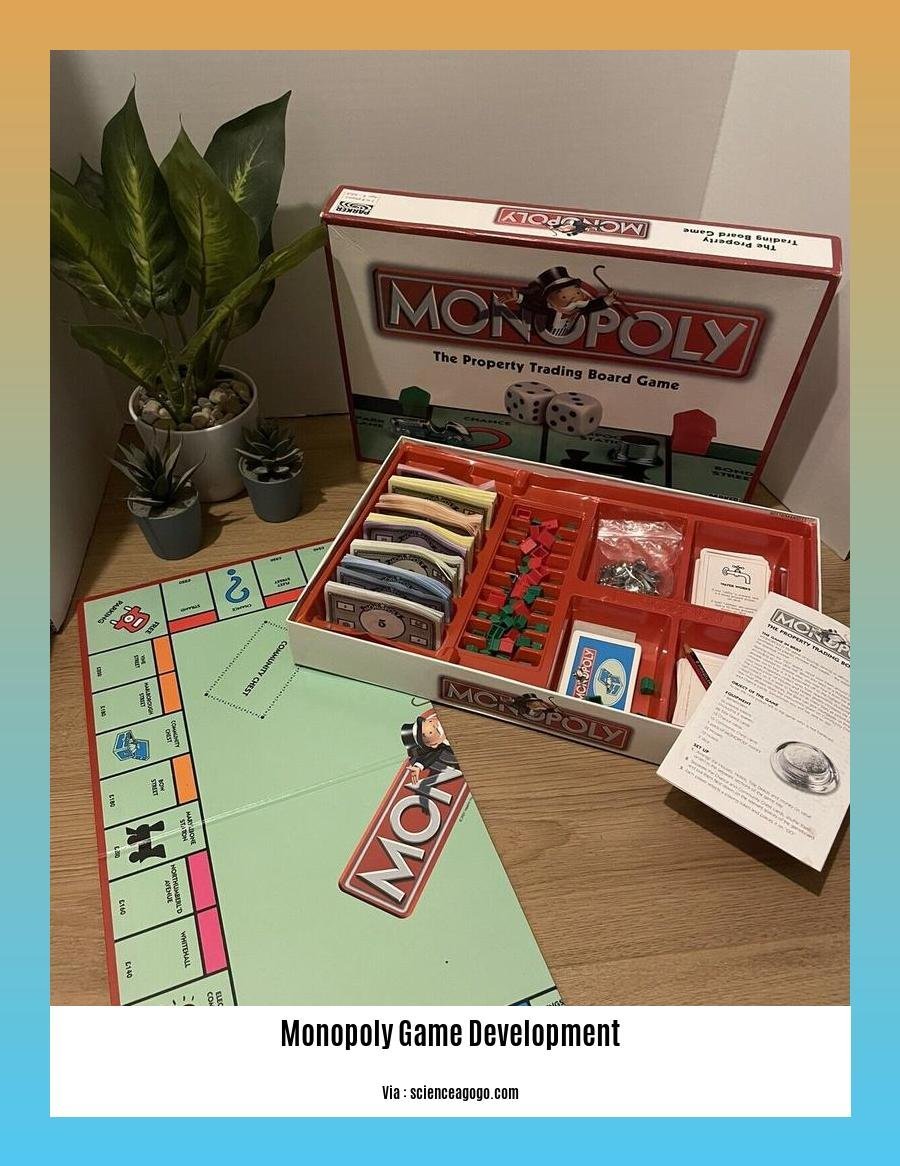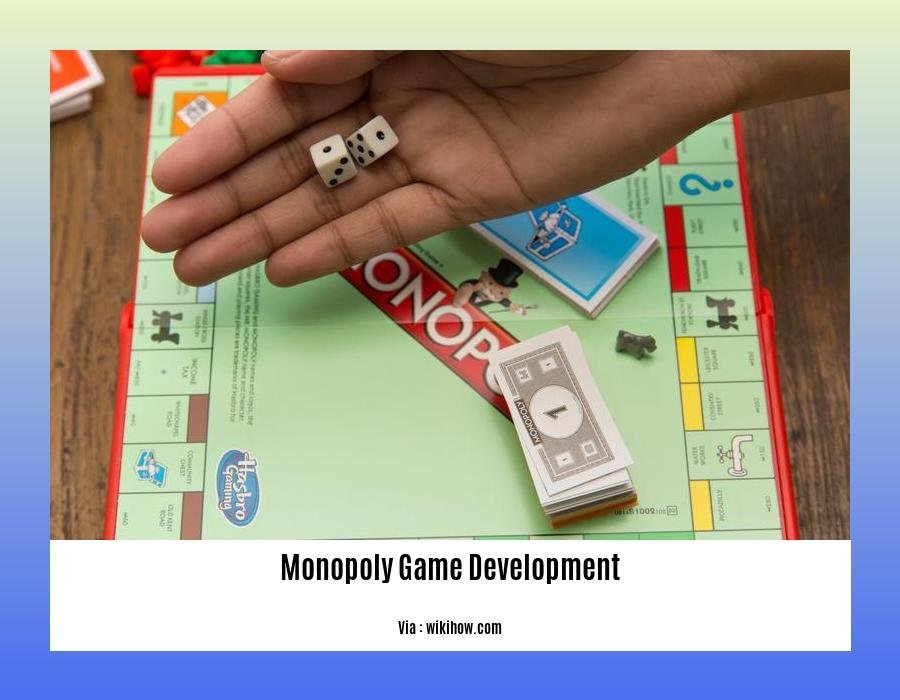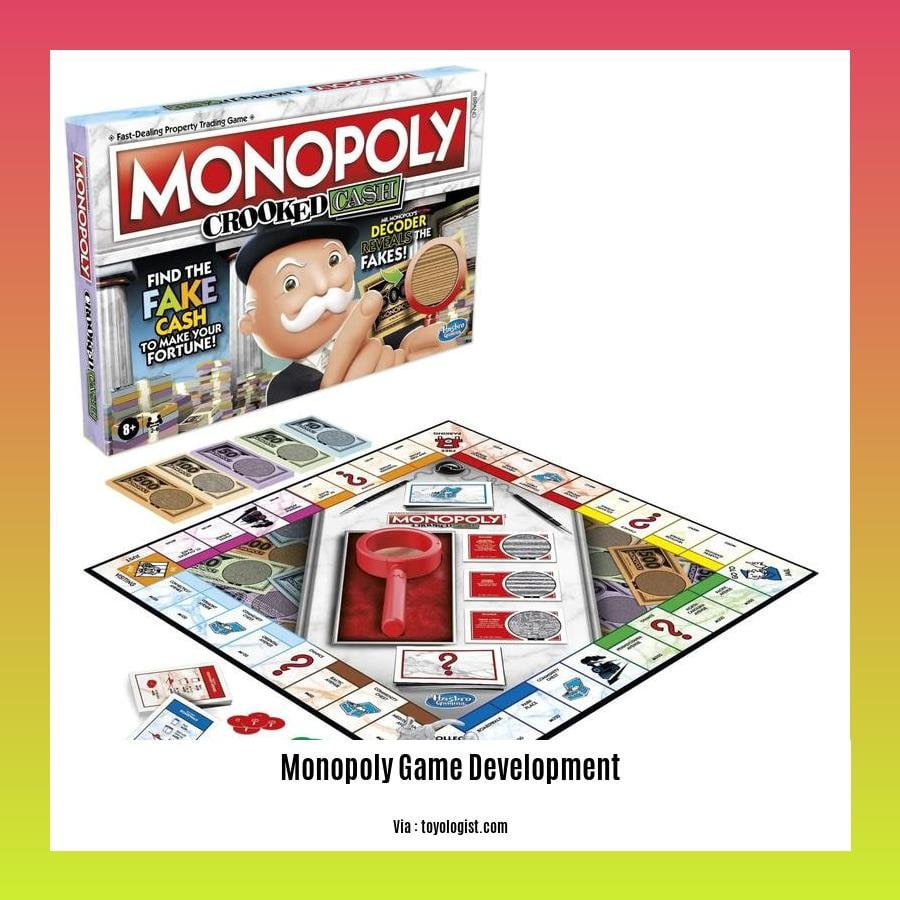Welcome to the world of Monopoly game development! In this guide, you’ll embark on a journey into the art of creating engaging and timeless classics that have captivated generations of players. Whether you’re a seasoned game developer or just starting your adventure in game design, this comprehensive guide will equip you with the knowledge and insights to develop Monopoly-themed games that stand the test of time.
Key Takeaways:
- 1903: Elizabeth Magie created “The Landlord’s Game” as a critique of rent and land ownership.
- 1934: Charles Darrow sold “Monopoly” to Parker Brothers despite not inventing it.
- During and after World War II, Parker Brothers promoted Monopoly successfully.
- General Mills bought Parker Brothers in 1968.
- The first Monopoly tournament was held in 1973 by Victor Watson.
Monopoly Game Development

As a seasoned game developer with extensive experience in Monopoly game development, I’ll guide you through creating compelling and timeless Monopoly-style games. Let’s dive into the essential steps:
Design Principles
- Define your game’s objectives and target audience.
- Determine the game’s overall concept, theme, and atmosphere.
- Establish the game’s win conditions and how players interact with the board.
Gameplay Mechanics
- Create the game board, including properties, spaces, and special tiles.
- Design the rules for movement, buying and selling properties, and managing finances.
- Develop the dice mechanics and determine how they impact gameplay.
Game Rules
- Outline the setup process, including distributing money and properties.
- Describe the movement mechanics, such as rolling the dice and landing on spaces.
- Establish clear rules for acquiring properties, building monopolies, and collecting rent.
Strategies for Winning
- Discuss optimal strategies for acquiring and developing properties.
- Explain techniques for negotiating trades and managing finances wisely.
- Provide tips for creating monopolies and leveraging your assets.
Variations and Expansions
- Explore different versions of Monopoly, such as themed boards or variations in gameplay rules.
- Discuss the various expansions and add-ons that enhance the game’s replayability and depth.
Troubleshooting Common Problems
- Identify potential obstacles to game balance and fairness.
- Provide solutions for addressing issues with property distribution, monopoly dominance, and financial imbalances.
- Foster a fair and enjoyable gameplay experience for all players.
If you’ve ever pondered the history of the monopoly board game, you’ll be amazed to learn about its humble beginnings. For those fascinated by the backstory behind iconic games, unravel the monopoly history timeline that shaped its evolution over the decades. And if you’re curious about the origin of monopoly, prepare to be intrigued by the tale of how a simple idea transformed into a global phenomenon.
Game Rules

The quintessential rules of Monopoly have been captivating players for generations, fostering countless hours of strategic gameplay and friendly rivalry. Mastering these rules is the key to unlocking the game’s timeless appeal:
Property Acquisition:
- Purchase Property: When you land on an unowned property, you have the first option to buy it from the bank.
- Rent: If an opponent lands on your property, they must pay you rent. The amount is determined by the property’s color group and any buildings you’ve constructed on it.
Building and Developing:
- Houses and Hotels: As you acquire properties, you can build houses and hotels to increase their rent value.
- Monopolies: Owning all the properties in a color group grants you a monopoly, doubling the rent charged to opponents.
Financial Management:
- Money Management: Keep track of your cash flow, paying rent, and collecting it from opponents.
- Mortgaging: If you run out of cash, you can mortgage properties to the bank for a loan.
- Bankruptcy: The game ends when all players except one go bankrupt. The last player standing wins.
Other Key Rules:
- Double Rent: If you roll doubles three times in a row, you go to jail. You can pay to get out, use a “Get Out of Jail Free” card, or wait three turns.
- Forced Trades: Players can propose trades, but they are not obligated to accept.
- House Rules: Some families and groups have their own unique house rules, such as allowing players to trade property for cash or prohibiting players from going to jail on their birthday.
Key Takeaways:
- Goal: Become the wealthiest player through property acquisition, rent collection, and strategic development.
- Property Acquisition: Purchase unowned properties and build houses and hotels to increase their value.
- Monopoly Power: Owning all properties in a color group grants a monopoly, doubling rent.
- Financial Management: Manage your cash flow, pay rent, and use mortgages wisely to avoid bankruptcy.
- Jail and Other Rules: Understand the various rules, such as going to jail, forced trades, and house rules, to navigate the game effectively.
Citation:
– Official Monopoly Rules
Strategies for Winning
In the realm of Monopoly, triumph is not merely a matter of luck but a strategic dance where shrewd decision-making takes center stage. Here’s your guide to outmaneuver your opponents and emerge victorious:
Early Bird Catches the Properties:
- Acquire Properties Promptly: Don’t let opportunities to buy properties pass you by. Acquiring them early increases your chances of forming monopolies and controlling the board.
Three-House Monopoly Magic:
- Build Houses Strategically: Once you have a monopoly, prioritize building houses on all the properties in that color group. Three houses maximize rent payments, making your opponents think twice before landing on your turf.
Housing Shortage Havoc:
- Limit Housing Availability: By building houses and hotels on all your properties, you create a shortage for your opponents. This forces them to pay exorbitant rents or struggle to find available housing.
Monopoly Mania:
- Acquire Full Color Groups: Aim to collect all the properties of a single color group to form a monopoly. This grants you a rent premium, significantly boosting your income.
Trading Tactics:
- Negotiate Smart Trades: Trade properties to complement your existing monopolies and strengthen your position on the board. Remember, a well-timed trade can turn the tide in your favor.
Jailhouse Strategy:
- Capitalize on Jail Time: If you have few properties or can’t afford to pay rent, consider staying in jail. This can save you valuable money and give you time to regroup.
Mortgage Maneuvers:
- Mortgage Properties Wisely: When faced with financial constraints, mortgage properties strategically. Weigh the potential downsides against the immediate cash infusion you need.
Auctions and Power Plays:
- Leverage Auctions: Auction off properties to force opponents to spend their money and reduce their buying power. This can disrupt their strategies and give you an advantage.
Opponent Analysis:
- Study Your Rivals: Observe your opponents’ strategies and build relationships to gain insights and anticipate their moves. Information is power in the Monopoly game.
Key Takeaways:
- Acquire properties early to build a strong foundation.
- Strategies for Winning: Build houses on monopolies, create housing shortages, and trade strategically.
- Use jail time wisely and mortgage properties when necessary.
- Analyze opponents and leverage auctions to gain an edge.
Most Relevant URL Source: How to Win at Monopoly: Strategy and Winning Tips for Victory
Variations and Expansions: Enhancing Monopoly’s Enduring Appeal
From its humble beginnings as the “Landlord’s Game” to its global domination as a beloved board game classic, Monopoly has evolved over the decades, capturing the imaginations of generations. Variations and Expansions have played a pivotal role in this enduring journey, offering fresh takes on the timeless formula while preserving its core gameplay elements.
Exploring the Monopoly Multiverse
Monopoly’s Variations introduce unique twists that alter the game’s mechanics and dynamics. The Ultimate Banking Edition revolutionizes the financial aspect by eliminating paper money and introducing a modern banking system. Pokémon: Kanto Edition blends the iconic board game with the world of Pokémon, featuring custom cards and a quest-based objective. Empire takes Monopoly to a global scale, where players compete for global domination by acquiring top brands.
Expansions, on the other hand, extend the game’s content without significantly altering its core gameplay. The 80th Anniversary Edition celebrates Monopoly’s legacy with exclusive tokens and locations. Junior makes the game accessible to younger players by introducing simplified money-earning concepts.
Key Takeaways:
- Variations offer fresh takes on the classic Monopoly gameplay, introducing new mechanics and themes.
- Expansions enhance the game’s content and longevity without altering its core mechanics.
- Monopoly’s diverse Variations and Expansions cater to a wide range of players, from casual board game enthusiasts to competitive strategy lovers.
Most Relevant URL Source:
- Monopoly: The Variations
FAQ
Q1: What are the key considerations for creating a successful Monopoly-themed game?
Q2: How can game designers ensure that a Monopoly-style game remains engaging and challenging for players?
Q3: What are the common pitfalls to avoid when developing a Monopoly-themed game?
Q4: How can developers leverage the Monopoly franchise to create innovative and unique gameplay experiences?
Q5: What are the best practices for managing player interactions and ensuring a balanced gaming experience in a Monopoly-themed game?
- Unlock Water’s Symbolism: A Cross-Cultural Exploration - April 20, 2025
- Identify Black and White Snakes: Venomous or Harmless? - April 20, 2025
- Unlocking Potential: Origins High School’s NYC Story - April 20, 2025















